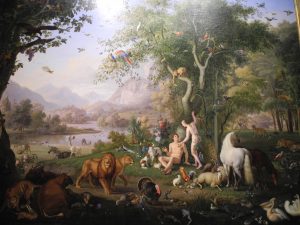setting boundaries
Incumbent with any attempt to define morality and the moral order as objective is the absolute necessity for God to be the source and substance of it. For it is God who is the final arbiter, the supreme judge of what is right or wrong, good or evil. Yet we have been reluctant to accept that from the very beginning.

In the garden
God told man “You are free to eat from any of the trees of the garden except the tree of knowledge of good and bad. From that tree you shall not eat; the moment you eat from it you are surely doomed to die.”[1] Adam and Eve chose to determine for themselves whether what God had forbidden was really evil or whether he was simply playing them for suckers. What is important to understand is that the fall did not occur because they discovered the meaning of evil; the fall occurred because they did evil, they disobeyed God. They came to know evil by experiencing evil and becoming evil.
Underlying the fall is this question: “Why would man, created by God and happy in the Garden of Eden, wish to commit such a flagrant act of disobedience?” Even one so universally revered as Saint Augustine had difficulty in providing an adequate response to that question. Saint Anselm however did provide at least one reasoned explanation in his dialogue “On the Fall of the Devil” where he argues that angels, like humans have two motivations for doing anything.[2]
The first motivation is self-interest or happiness which basically means doing what benefits you, what makes you happy. The second motivation is justice or morality which means doing what God wants you to do. It is difficult to conceive of any action or decision that we might make that is not motivated in some way by either the desire to be happy or the desire to do what is right.
It is imperative that we occasionally remind ourselves that the God who created us chose to give us Free Will which means that we are free to choose what is moral and right, that is, what God wants us to do, or to choose what we believe will make us happy. I am free to choose my way or God’s way and if I choose my way I can rest assured that God will do nothing to prevent me from doing whatever I desire.
“Some people, however, disregarding the dependence of human reason on Divine Wisdom and the need, given the present state of fallen nature, for Divine Revelation as an effective means for knowing moral truths, even those of the natural order, have actually posited a complete sovereignty of reason in the domain of moral norms regarding the right ordering of life in this world. Such norms would constitute the boundaries for a merely ‘human’ morality; they would be the source exclusively in human reason. In no way could God be considered the Author of this law…”[3]
Those who have posited this view often interject Free Will into the argument, with no true understanding of what that means. I will explain next week.
[1] Gn 2:16-17.
[2] Dinesh D’Souza, What’s So Great About God: A Reasonable Defense of the Goodness of God in a World Filled with Suffering, Tyndale House Publishers, Inc., September 2013.
[3] Pope Saint John Paul II, Veritas Splendor, Encyclical Letter, §36, August 6, 1993.
